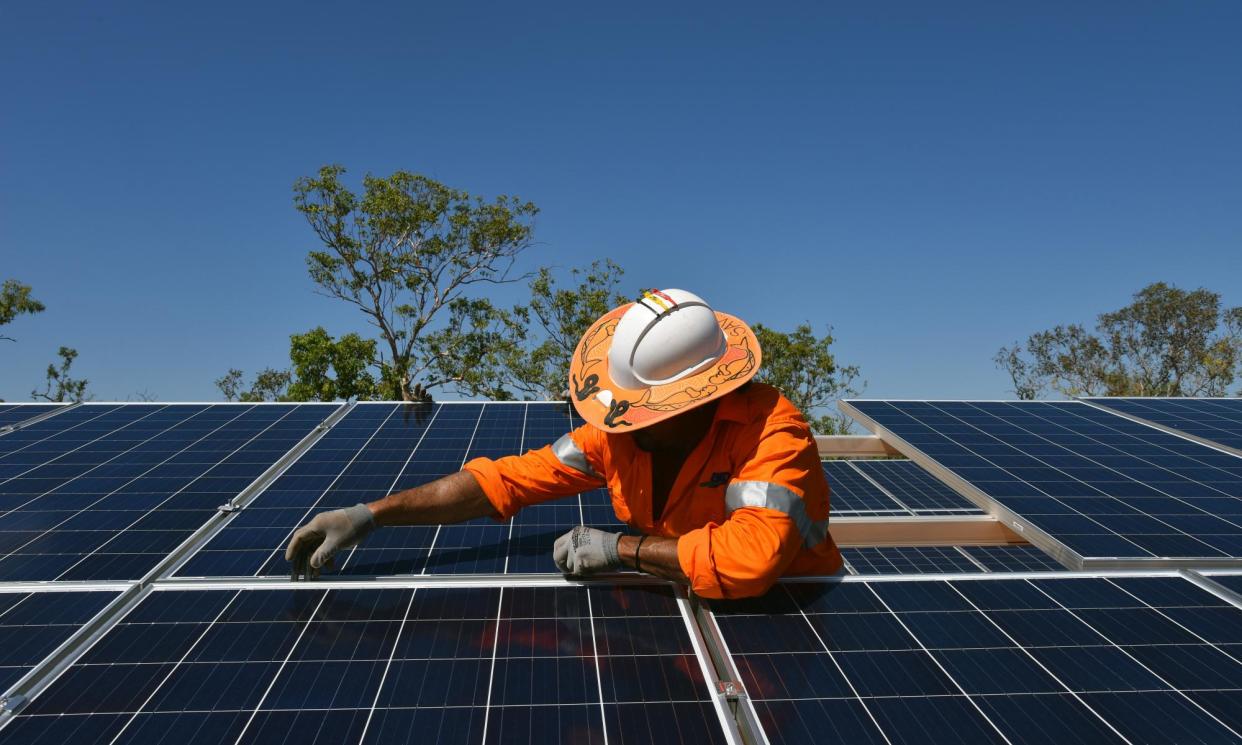‘Money and energy to be saved’: how to get Australia’s body corporates to go green

Whether you’re an owner or a renter living in an apartment, navigating the dreaded body corporate can be like tiptoeing through a minefield of different opinions and competing interests.
So how do you negotiate making eco-improvements to your building, when it can be hard enough to get agreement on rules for hanging out your washing?
Of course there’s no one-size-fits-all approach, as it will vary greatly depending on your building and the makeup of your strata committee – but here are a few tips to help you get started.
‘A good audit’
A good first step, according to Megan Chatterton, chief resilience officer for the Owners Corporation Network, is to get an energy efficiency assessment done on your building. This is something the body corporate will have to pay for – although there are grants in some states to offset the costs, and you may end up saving money overall.
Assessments are carried out through the National Australian Built Environment Rating System (Nabers), and will measure and compare your building’s energy efficiency, water usage, waste management and indoor environmental quality. It will provide a roadmap for improvements that can often save both energy and money for all tenants.
“You’ll be in a much better position to approach your strata committee – once they realise there is money and energy to be saved,” says Chatterton.
“A good audit will also show if you are on the correct energy tariff. We’ve seen savings worth thousands of dollars a year simply by switching to the correct tariff.”
Related: Can’t afford a home battery for your solar? It might be worth joining a Virtual Power Plant
Chatterton suggests getting the body corporate’s treasurer onboard by focusing on the opportunity to reduce business-as-usual costs.
Perhaps start with the low-cost, high-impact upgrades such as lighting, heating and ventilation to demonstrate savings before you tackle the higher-value upgrades such as solar panels on the roof.
“Prepare well in advance for upgrades to major plants and equipment like gas hot water systems. If you don’t, you’ll risk replacing like with like and missing the opportunity to add value and save money,” says Chatterton.
EV charging stations
Deciding whether to get an EV charging station put into your building will depend a lot on demand (how many people have EVs) and the availability of local public stations. The main advantage of doing so is that charging stations can charge between three and 10 times faster than from a standard powerpoint.
According to motoring journalist Toby Hagon, the sustained growth in electric vehicle sales means now is a good time to open a discussion with your body corporate about getting ahead of the curve.
“We are all going to be driving a lot more electric vehicles in the future,” he says, while acknowledging that some older blocks have challenges installing wiring to parking areas, which will need to be factored in.
Last year, the Australian Building Codes Board published these recommendations for building owners, while from October the National Construction Code put in place requirements for new apartments.
The first step, he says, is to put the proposition on your building’s AGM agenda, explaining that EVs won’t affect power to your building, and can be metered to particular apartment owners – especially as they normally charge overnight or in the early morning, when building energy demand is low.
Hagon recommends reaching out to companies such as Jetcharge or RevCharge to provide quotes to fit your building and to check what government subsidies are available throughout Australia.
Vegie gardens and composting
While digging a vegie garden and installing a compost bin in the back yard of apartments may seem like a no-brainer, they can quickly become hard to manage.
Xuan Wang, Melbourne founder of City Compost Network podcast, has found that many onsite apartment composting efforts face limitations with space and efficiency, and struggle to properly educate residents on how to separate organics from general landfill. Hence, her podcast.
“My aim is to build resilience in our soil and community, one batch of compost at a time,” she says.
Currently 132 out of 563 Australian city councils collect organic matter for composting – find out if your council is one of them here – and if not, consider lobbying them to do so.
Alternatively organisations such as the ACT’s Capital Scraps pick up compost from apartments, to save residents the fuss.
Founder Brook Clinton says if you are going to pursue a communal compost, she’d strongly suggest a roster system so that one person doesn’t take it all on and burn out.
Strata rules
Renters obviously have far less ability to bring about environmental building improvements than owners do. But for pesky things like being ordered not to use verandas to dry your clothes, Joel Dignam, director of Better Homes for Renters, recommends renters use their own discretion.
“As a renter, you are meant to follow strata rules but you don’t have any say in shaping those rules,” he says.
“So if there’s a rule that says you can’t use a clothes airer on a balcony, you can’t challenge that rule but you could choose not to comply with it, knowing that non-compliance with unjust laws is … a perfectly ethical thing to do.”
While your body corporate may reach out to your landlord to order you to stop, that could cause a wider discussion about the validity of the rules in the first place. Be warned, though, that your lease “would typically require you to follow strata rules, so ongoing non-compliance could be a breach of your tenancy agreement”.
“Owners, of course, have more say. Although bylaws are often standard and feel set, owners can change them, and where bylaws are stupid or petty or result in perverse outcomes – like people not being able to dry their laundry – then it’s worth trying to update them,” Dignam says.


